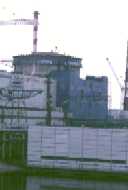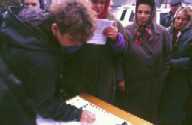 |
Vol 1, No 9, 23 August 1999
|
|
|
 N U C L E A R P O W E R:
N U C L E A R P O W E R:
Forward to the Past Will the West underwrite nuclear power for Ukraine? Andreas Beckmann Just at a time when Western societies are having serious second thoughts about nuclear energy as they reassess its risks and hidden costs, nuclear power seems to be gaining its second wind in Central and Eastern Europe. The Czech government, split remarkably along generational lines, voted in May to complete construction of the Temelin nuclear power plant. There is also a good chance that a couple of new reactors will soon follow in Ukraine. The involvement of Western countries with regard to the Temelin decision was largely limited to sharp words from the Austrians, who will bear much of the fallout if the reactor fifty kilometers from their border goes the way of Chernobyl; at the same time, the political fallout from Temelin in the West is unlikely to be more than some scuffles in the EU regarding whether the plant should be counted against Czech accession to the Union. In Ukraine, by contrast, Western governments have become mired in the planned construction of the Khmelnitsky 2 and Rivne 4 nuclear power stations and find themselves stretched between the Ukrainian government's determination to build the reactors on the one hand and increasing pressure against nuclear energy at home. The fate of the Khmelnitsky 2 and Rivne 4 reactors (commonly referred to as K2/R4) will hang in the balance at the next meeting of the European Bank of Reconstruction and Development (EBRD) in September. Though the bank's loan of USD 190 million would cover only a small percentage of the USD 1.72 billion needed for the project, it will provide crucial backing that is expected to lead to further support from Euratom, Russia and export credit agencies based in Europe, Japan, and the United States. The proposed loan is part of a larger package of USD 2.3 billion pledged by G-7 countries to support a complex investment program in the Ukraine. The K2/R4 project was actually the brainchild of Western governments, as the Ukrainian government has pointed out on more than one occasion. It "was proposed by Western partners as an alternative to the Ukrainian bid to build a steam-gas power plant," President Kuchma wrote in a recent letter to British Prime Minister Tony Blair. The initial enthusiasm of Western governments for the nuclear option is now proving an embarrassment as the attractiveness of the project and nuclear power increasingly wanes. Loan payments in beef and bras? The funding pledged by the G-7 countries to Ukraine in 1995 was to be based on least-cost planning principles. Preparation of the nuclear project made clear that K2/R4 was clearly not the least-cost option. An independent Panel of Experts contracted by EBRD to review the economics of the project in 1997 concluded that "K2/R4 are not economic" and that "completing these reactors would not represent the most productive use of USD one billion at this time." Since then, the estimated cost of completing the project has risen from USD 1.2 to 1.72 billion. Energy needs in the Ukraine are declining and could best be met through conservation and demand-side management, the panel found. In 1997, energy consumption in the country declined by an additional 7%, and another 3% in 1998. There is a significant over-capacity in electricity generation in Ukraine, with an overall installed capacity of 53.9 GW in 1997. Even without the Chernobyl nuclear power plant, this is about twice the capacity needed to cover current electricity demand. A confidential study done by the European Investment Bank in January 1999 states that " a substantial degree of uncertainty attaches to a number of key parameters of the project, notably - but not exclusively - the demand of electric power and project costs, resulting in high financial and economic risk relative to the [energy] sector." The hefty price tag attached to the project plus inevitable cost-overruns will do nothing to improve Ukraine's already critical financial situation. Some estimates put the monetary payment for electricity at 4.2 to 4.5%, while barter payments made up 52 to 53% of the total bills collected in November 1998. The remaining 40-odd percent of all electricity is presently going unpaid. In the beginning of 1999, cash collection decreased to 2%. Experience has shown that higher tariffs lead to further decreases in the rate of payment. Certainly, under the current payments regime, it is questionable whether Ukraine will repay any loans in the foreseeable future.  Unlike the Czech population, which has remained relatively steady in its support of the Temelin nuclear power plant despite massive cost overruns and mismanagement, Ukrainians have not shared their government's enthusiasm for the new reactors. A public opinion poll done by SOCIS-Gallup International this spring found that completion of K2/R4 is supported by 9% of the Ukrainian public. Three public meetings, including one in Neteshin, home of many nuclear workers, registered not a single voice in favor of the plants. One reason for the soft support among a population still shouldering the costs of the Chernobyl accident may be the safety problems of the two Russian designed 1000 MW VVER units, which do not meet Western safety standards. Energoatom, the state-owned nuclear energy company is planning to begin operating the reactors before implementing all safety measures and will only correct some of the known problems at the first refueling. Atomkraft Nein Danke As the problems surrounding K2/R4 have increasingly emerged, the fortunes of the nuclear industry in the West, already on the wane following the Chernobyl disaster, have plummeted to the point where they are unlikely to be revived. Growing popular opposition to nuclear energy has been accelerated particularly by the recent success of Green parties in a number of countries. Germany, Norway and, recently, Belgium are planning to follow Austria in phasing out their nuclear industries. The decisions have been matched by a similar resolve not to support nuclear energy abroad. As a result, supporters of K2/R4 have dwindled. Among the main proponents are the Western nuclear industry, including corporations such as Siemens, that are currently pinning their hopes on the East, in general, and the Ukrainian government in particular. But this spring, the German, Italian, and British parliaments called on their governments to oppose the construction of K2/R4. Public pressure has also increased. In June, CEE Bankwatch Network, Greenpeace, the Environmental Defense Fund and 250 other organizations across 43 countries called on the G-7 leaders assembled in Cologne not to finance the plants. The G-7 governments in Cologne made a Solomon decision to send German Chancellor Schroeder to Ukraine to try to talk the Ukrainians out of the project. The choice of delegate was not random. Shortly before the Cologne summit, the K2/R4 issue had sparked a crisis in Germany between the Greens and Social Democrats that threatened to pull down their coalition government. Green and Social Democrat members of parliament united in calling on the government not to support the project, a demand opposed by the chancellor, who held fast to the policy of the G-7 to that time. Schroeder's trip to Kiev gave him the chance to assure people back home - especially the suspicious Greens - that he was trying his best to find an alternative to the project. Between banquets and visits to Graves of Unknown Soldiers, Environmental Minister Juergen Trittin, who accompanied the Chancellor on the trip, presented Ukrainian officials with a proposal for an alternative package that included gas turbines and other energy sources. The intentions of Schroeder and the G-7 - if they were serious - were frustrated by the Ukrainian government's stalwart refusal to consider any change in plans. The Ukrainian officials, according to one German participant at the meeting, simply read out explanations that had been pre-written. Schroeder took the Ukrainians' stonewalling in stride. There is more to German-Ukrainian relations than energy policy, he had declared upon arriving in Kiev. And in any case, he now said, Chernobyl was most important. He did not want to have the ticking time bomb on his conscience. If completing the planned nuclear reactors, however uneconomic and however unpopular, was the price of pulling the plug on Chernobyl, so be it. Green Environmental Minister Trittin, still licking his wounds from the political thrashing he had received over his efforts to push the pace of German withdrawal from nuclear energy, returned with his Chancellor from Kiev with scarcely a murmur. In the best of Soviet traditions Kuchma's clinging to the K2/R4 project is reminiscent of Soviet leaders' infatuation with monster projects with no regard to cost or actual need, in financial let alone environmental terms. Just as in former times, public opinion is loose change, and opponents are treated harshly. In this case, though, Western governments may well end up underwriting the project, and despite the considerable contradictions that will result next to their own domestic policies. As Western countries begin looking forward in their energy policies and look to conservation, decentralization, co-generation and renewable sources of energy to meet future energy needs, they may help keep Ukraine stuck in the past. "My sense is that there is more to this than Chernobyl, for which there are more attractive non-nuclear alternatives, that incidentally would rely at least as much on Western technology as K2/R4," says Petr Hlobil of CEE Bankwatch. "I think that the G-7 sees K2/R4 as being important to the political future of Kuchma - and they want to keep him in power." Ironically, as country representatives head to the marble palace of EBRD in a few weeks to vote on the fate of K2/R4, it may be Chernobyl - the site of the worst nuclear accident ever - that tips the balance (or simply provides an alibi) towards supporting Ukraine's expensive, unpopular and very dangerous White Elephant. Andreas Beckmann, 19 August 1999
|
|
![]()
Copyright (c) 1999 - Central Europe Review and Internet servis, a.s.
All Rights Reserved